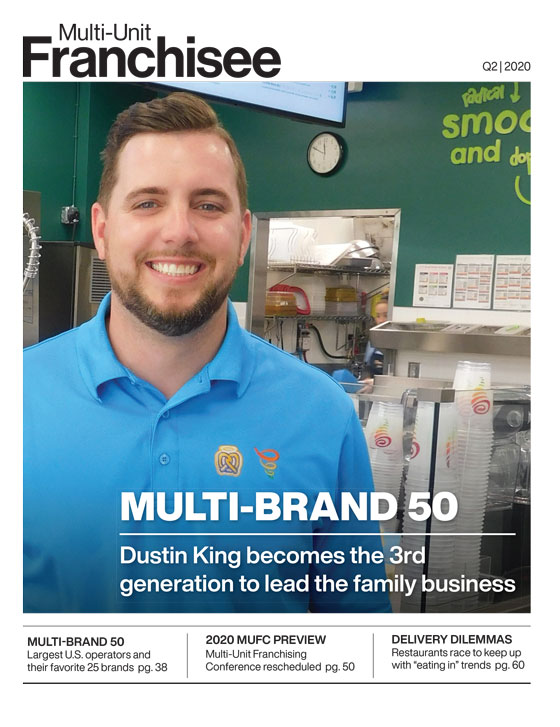Family, It's Complicated: Partners, Children, and the Bottom Line

Defining the members of your business family can be difficult--especially when considering the idea that members of your "business family" include anyone you do business with for reasons other than just to make money. As a result, family dynamics can become quite complex among minority partners you may have, whether they are blood-related or not.
Whether your minority partner(s) joined you through a stock recognition plan, equity buy-in, or at the inception of building your multi-unit franchisee business, there are very simple, common expectations that, surprisingly, can be misconstrued. First--and foremost--is simply that "We are in this to make money, period." Second is that your partner provides something you consider important to the overall success of the organization.
Simple, right? Unfortunately, there is at least one season of life that complicates these two simple assumptions: the coming of age of children, whether yours or your partners'.
Let's assume for a moment that neither your children nor your partners' children, have shown any interest in your business. Then you can continue doing what you're doing without interruption and everything will work out, right? Well, no.
In today's world, it is not out of the realm of probability that a child will live with mom and/or dad into their 30s, paying reduced or no rent. Having worked with several parents in this position, I can attest that there is a natural inclination to view the business as an opportunity to help launch Junior into the world and get them on their way. As a result, it can be extremely difficult to deny a request to give Junior a job until they figure out what they want, particularly if you have not addressed it ahead of time. Furthermore, it is in this moment that at least one partner has shifted away from the first simple expectation because now you are no longer in business "just to make money." Instead, the business has become a support system, a fallback plan that transcends day-to-day business performance.
Many young adults today have no idea what they want to do, and there is a natural tendency by parents to keep the opportunity open should the children decide to commit someday. This has been known to affect hiring decisions, delaying the fulfillment of vital management roles within the organization in the hopes that one day Junior will want to join the business. Sounds crazy, but it's true!
Again, this is a shift away from the "profitability first" approach and puts the minority partner in a precarious position to either engage in the family dynamics or begrudgingly hold their tongue. This is when the value of the partnership can begin to decay, causing a minority partner to withdraw and be less inclined to contribute at the level you had grown to expect. Therein lies the shift away from the second simple expectation: You are no longer as concerned with your partner's input, even though they will share in the result.
More complications
Further complicating the dynamic is the question as to whether the business can be kept in the family and operated by a board, or whether a sale is imminent. Although there is significant complexity surrounding a board of directors, it can be done. And while a sale is the simplest alternative, the question becomes to whom, and at what price? Under the umbrella of a family business, sales and transfers among family are generally expected to be made as fairly as possible and commonly involve discounts, while a sale to an outside third party merits a hard-line negotiation to capture every available dollar. How do you find the balance if your family sells to your partner?
On the other hand, if either partner's children or family seek employment in the business, there is obviously a long list of governance considerations that easily exceed the scope of this column. One significant factor pertaining to this topic, however, is finding the balance between the urgency to remain focused on the bottom line, while remaining patient with the developmental process of a successor.
Part of the beauty a family business can offer is the lack of pressure for immediate returns that a publicly traded company has to deal with. The strategic planning of a privately held business can and should take into account a much longer timeline, allowing for the development of the next generation of leaders. This long-term approach, however, is likely to result in a performance dip at some point. If your partners are not on board with the potential for a self-imposed performance dip, then trouble is certainly on the horizon. This is a difficult tightrope to walk as every successor needs the opportunity to learn from their mistakes. But is it okay if it's at the expense of a partner simply looking to maximize their return?
Clarifying expectations of the next generation, whether or not they are in the business, is a critical step to maintaining a lasting partnership. If you're thinking that you have the time and it's not a problem right now, then now is the time to address it. Overcoming partnership issues regarding family after the cards are on the table can be like trying to put toothpaste back in the tube.
Jeff Bannon is a partner and succession advisor with The Rawls Group, a business succession planning firm with offices in Atlanta, Orlando, Des Moines, and Los Angeles. For more information, visit www.rawlsgroup.com or email [email protected].
Share this Feature
Recommended Reading:
FRANCHISE TOPICS
- Multi-Unit Franchising
- Get Started in Franchising
- Franchise Growth
- Franchise Operations
- Open New Units
- Franchise Leadership
- Franchise Marketing
- Technology
- Franchise Law
- Franchise Awards
- Franchise Rankings
- Franchise Trends
- Franchise Development
- Featured Franchise Stories
FEATURED IN

Multi-Unit Franchisee Magazine: Issue 2, 2020

$100,000
$250,000





 The multi-unit franchise opportunities listed above are not related to or endorsed by Multi-Unit Franchisee or Franchise Update Media Group. We are not engaged in, supporting, or endorsing any specific franchise, business opportunity, company or individual. No statement in this site is to be construed as a recommendation. We encourage prospective franchise buyers to perform extensive due diligence when considering a franchise opportunity.
The multi-unit franchise opportunities listed above are not related to or endorsed by Multi-Unit Franchisee or Franchise Update Media Group. We are not engaged in, supporting, or endorsing any specific franchise, business opportunity, company or individual. No statement in this site is to be construed as a recommendation. We encourage prospective franchise buyers to perform extensive due diligence when considering a franchise opportunity.